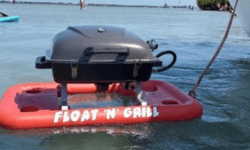So you came up with a great invention – let’s say a floating grill for cooking your burgers. You know that unless your grill has patent protection it will be knocked off immediately. Clearly, you need a patent. You read up on the topic and learn that you can file a patent application yourself – you only have to describe your grill in writing and drawings, add a claim, and file some forms and pay fees. So you do.
After a wait, the helpful patent examiner gets back to you, prompting you to correct the forms and come up with claims that the examiner will allow. Your application is allowed! Yay! You pay the issue fees and receive your patent. The world is a happy place.
Good news. After many, many hours of work and many, many thousands of dollars spent developing your invention, you find an investor, say, on Shark Tank.
Bad news. You learn that your patent claims are way too narrow – while they address magnetic attachments for your grill, there are many ways to attach things together other than magnets. Your patent claims do not protect your grill from copies that use any of those other attachment methods. Savvy copyists knock off your grill immediately.
Maybe that patent examiner wasn’t your friend after all.
Good news. While it’s too late to file a new patent application, you can ask the USPTO to “reissue” your patent under 25 U.S.C. 251 with broader claims if you file your request within two years of your patent’s issue date. So you do.
Bad news. Section 251 requires that the broader patent claims be addressed to “…the invention disclosed in the original patent.” The only invention disclosed was a grill with magnets. Your request to broaden the claims is rejected by the USPTO, by the Patent Trial and Appeal Board, and by the Federal Circuit. Your overly-narrow patent is unchanged. The copyists continue to legally knock off your grill. You’ve spent a lot of money on the reissue and the unsuccessful appeals with nothing to show for it. You realize that your decision to save money with a do-it-yourself patent was very expensive. The bottom line – the costs of patenting using a professional patent attorney are a small part of the cost of launching a new product. The case is In re Float’N’Grill LLC, 2022-1438.
— Robert Yarbrough, Esq.


